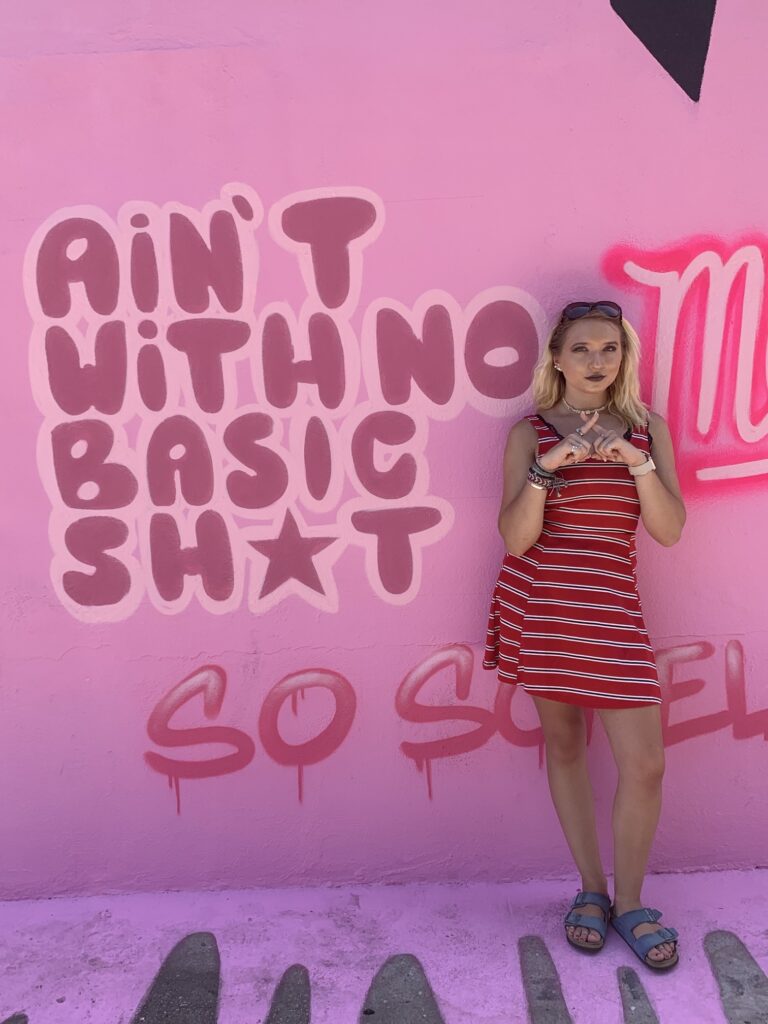Travel Guide to Bruges, Belgium
Ra's Travel Guide to Bruges
Discover the enchanting canal city known as "The Venice of the North" with this comprehensive travel guide to Bruges, Belgium.
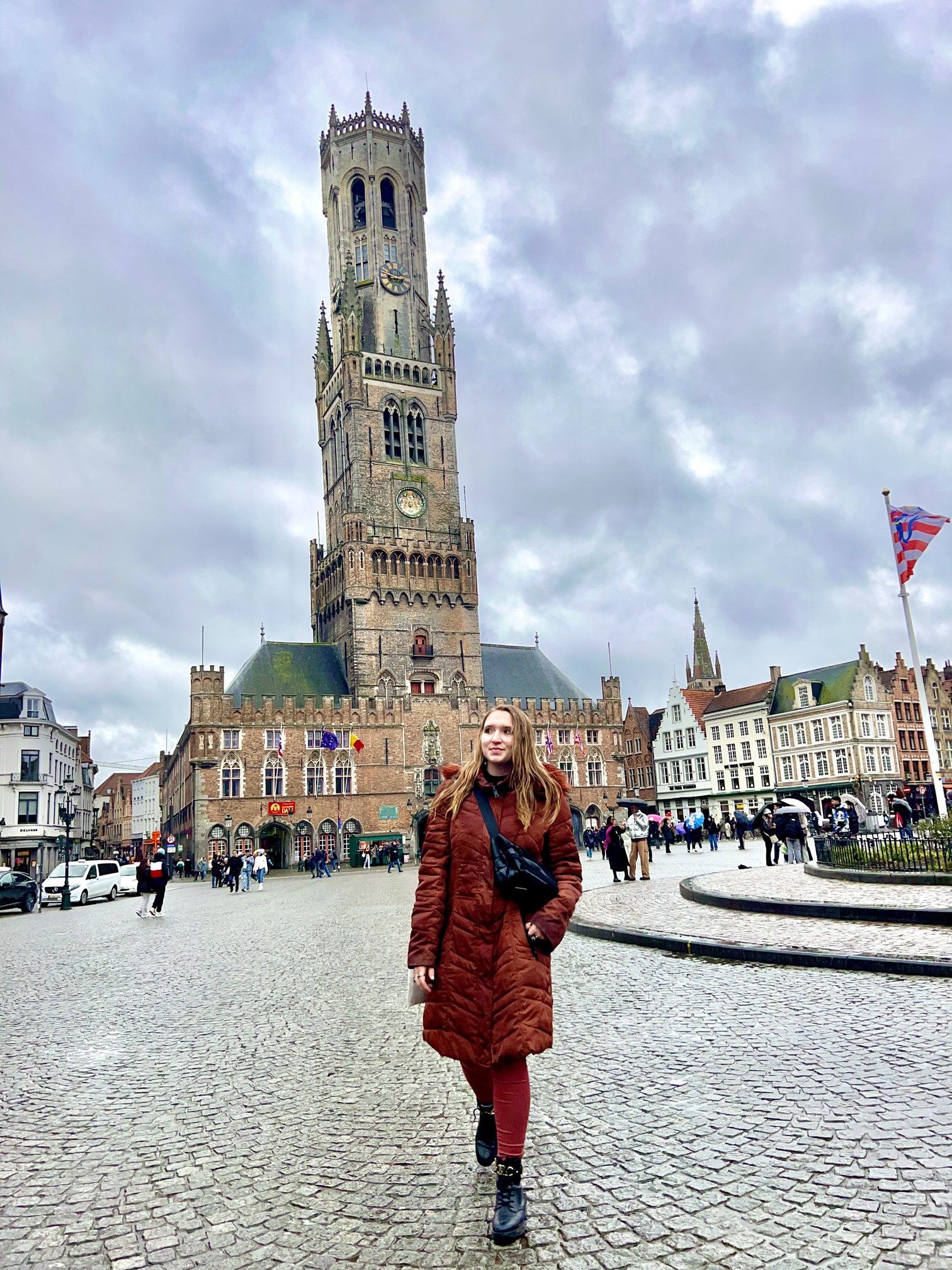
A city adorned with cobblestoned streets, exquisite architecture, and picturesque canals reminiscent of Venice. This unique blend, coupled with the ubiquitous horse-drawn carriages, has bestowed upon Bruges the reputation of being a romantic destination. Whether you refer to it as Bruges or Brugge in Dutch, this enchanting medieval city in northern Belgium beckons travelers for an unforgettable experience. Utilize this comprehensive travel guide to Bruges to plan your visit today.
Getting to Bruges, Belgium: Transportation Options and Travel Tips
Bruges enjoys excellent connectivity with the rest of Belgium through various modes of transportation such as buses, trains, boats, or cars, ensuring convenient access to the city from within Belgium. For international travelers, the most straightforward approach is to first journey to Brussels via bus, plane, car, or train, before making the connection to Bruges, as direct connections are available from each of their stations.
From major cities like Antwerp, Ghent, Hasselt, Leuven, and Brussels, travelers can opt for one of the 1 to 4 direct trains per hour to the 'Brugge Sint-Pieters' station daily. Upon arrival, the city center is easily accessible either by a short walk or a brief De Lijn bus ride. Alternatively, for a budget-friendly option, FLiXBUS and Flibco provide direct connections from these major cities, including direct routes from Brussels Airport and Brussels South Charleroi Airport. It is advisable to purchase bus tickets in advance, as they tend to sell out quickly.
For travelers with their own vehicles, driving to Bruges or taking their car on a ferry, both domestically and internationally, are viable options. However, driving through the city center is discouraged, with above-ground parking discouraged due to low-traffic or car-free streets at certain times. Instead, it is recommended to park at one of the free locations beyond the city center or utilize one of the two central underground car parks: Centrum-'t Zand car park, a 10-minute walk to the Market Square, and Centrum-Station car park, a 20-minute walk to the Market Square.
For efficient route planning, cost evaluation, and consideration of various transportation methods, I often rely on Rome2rio. This invaluable tool provides comprehensive information, offering insights into possible route combinations and suggestions for strategic stops along the way, ensuring a tailored and well-informed travel experience. Link to Rome2rio
Where to Stay in Bruges, Belgium?
Experience visiting a fairytale city and staying in a fairytale setting. Bruges offers a variety of accommodations catering to every traveler type and budget. Within the city, you'll find hotels, hostels, bed and breakfasts, and Airbnbs available. Accommodation prices tend to increase during the peak tourist season from April through September. To assist in deciding where to stay, here are the main regions of the city:
- City Center: Ideal for first-time visitors
- Ezelstraat Quarter: Suited for budget travelers
- Sint-Anna Quarter: Perfect for nightlife enthusiasts
- Sint-Gillis Quarter: An up-and-coming, trendy neighborhood
- Magdalena Quarter: Best for families seeking a quieter stay
During my visit to Bruges, I embarked on a day trip from Brussels. Depending on your travel goals, it's feasible to explore Bruges in a day or extend your visit for a few days to fully immerse yourself in its charm. Many tour groups offer day-excursion trips to Bruges, providing guided tours and organized transportation.
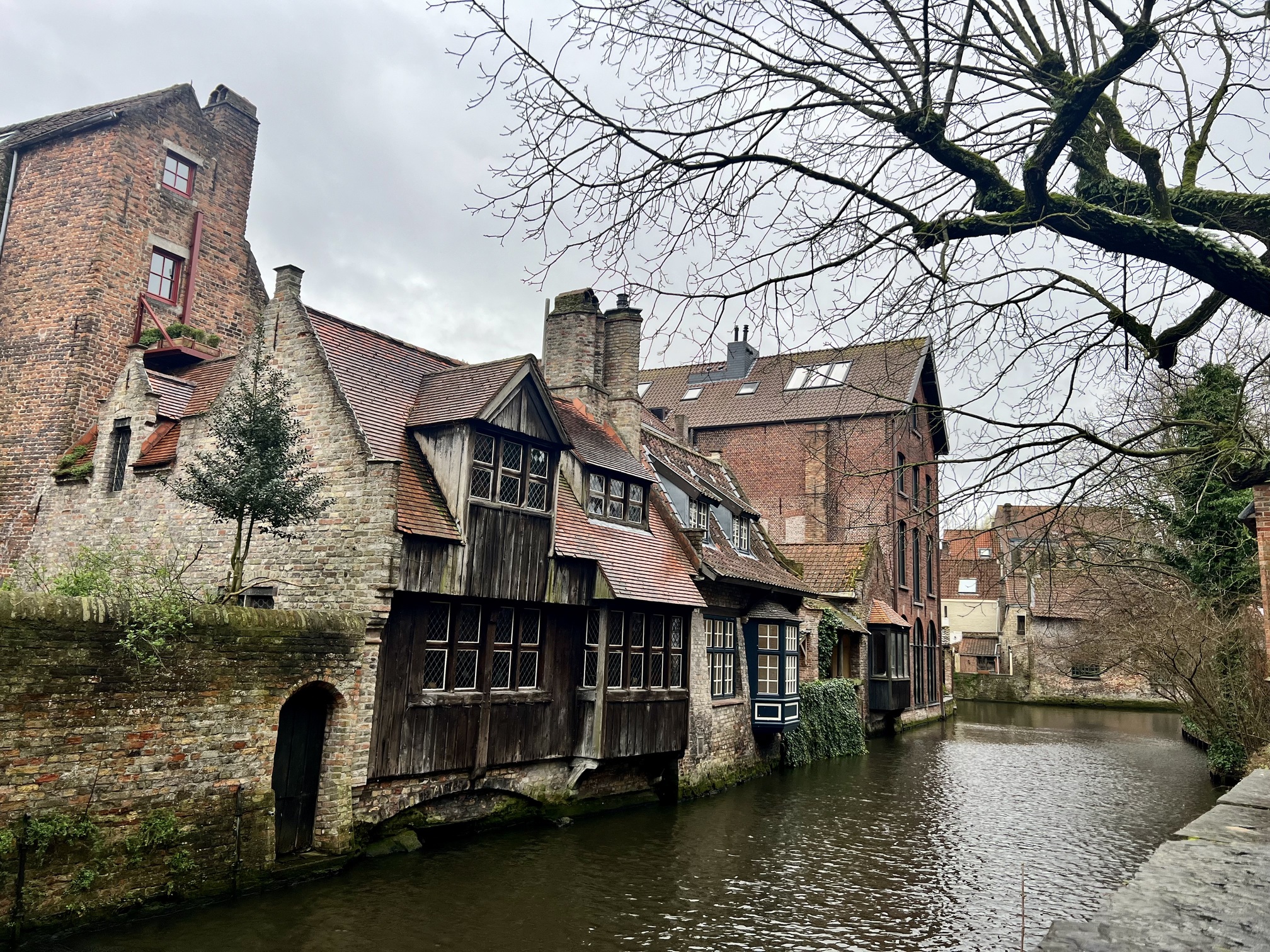
Guides to Belgium
Getting Around Bruges, Belgium
Car
While renting a car is not necessary if you’re just exploring Bruges, it can be advantageous for traveling around Belgium or to places where public transportation may not be available. Bruges is a low-traffic city, with above-ground parking discouraged. Vehicle traffic is also discouraged in the city center, where a 30 km/hr speed limit applies.
Bus
Direct public buses operate between the train station and the city center every 5 minutes. Numerous bus lines are available to connect you to the train stations via stops like Stadsschouwburg, Zilverpand, and ’t Zand. Tickets are priced at €2.50 and offer unlimited travel for 60 minutes, although prices may vary seasonally. Tickets can be purchased onboard via contactless payment, at the ticket shop Lijnwinkel, or from vending machines.
Horse-Drawn Carriage
For a unique experience, consider a romantic horse-drawn carriage ride through the city. Transport yourself back in time and explore Bruges in the manner of medieval travelers.
Taxi
Uber, Lyft, and traditional yellow taxis are all accessible for travel within the city. Taxi stands are distributed throughout Bruges, but it’s advisable to pre-order your cab for a potentially lower fare. Always confirm the cost of the ride and ensure that the meter is activated before agreeing to your journey.
Bike
Bike rental stands are conveniently located across the city and are easy to use. Simply download the app, link your credit card, and you’re ready to go! Explore Bruges at your own pace or join one of the many guided cycling tours available.
Walking
Exploring Bruges on foot is the optimal way to experience its charm, given its compact size. With its picturesque canals, architectural wonders, and cobblestone streets, strolling through the city offers an immersive experience. All major attractions are within close proximity, facilitating easy visits to key sights.
What to Do in Bruges, Belgium?
Historical Walking Tour
Embark on a guided tour of the fairytale city and learn about its history, as well as insider local tips. While many companies offer walking tours or bike tours, I highly recommend booking a free walking tour (click here), especially for budget travelers. In these tours, they’re led by locals as a passion project, and you get to set the price at the end with your cash tip.
Basilica of the Holy Blood
Dating back to the 12th century, this basilica is famous because it’s home to a holy relic, a cloth soaked in Jesus Christ’s blood. The basilica comprises two parts – St. Basilius Chapel, which is free to visit, and the Holy Blood Chapel and Treasury upstairs that require a 2.5 EUR fee. Walk inside and admire the beautiful architecture and the stained glass.
Belfry Tower
A UNESCO World Heritage Site built in the 13th century, standing at 272ft tall. Climb the 366 steps to get an aerial view of the city. If you visit on the hour, you will get to hear the tower’s bells ringing out their tunes. Other highlights of the building are the Cloth Hall, a treasury room with wrought iron doors from 1300, the clockwork mechanism, and the carillon drum dating from 1748.
Market Square
At the heart of the city is the Markt, an iconic symbol of Bruges, which has been the center of local life since 958, drawing visitors with its beautiful colorful architecture. It’s also the location of many restaurants, bars, cafes, museums, and events. Within the square is the famous Provincial Palace, a neo-Gothic building dating back to the 19th century. There’s also the oldest house on Markt Square, Huis Boechoute, dating back to the 15th century. It’s also the only building on the market square that has a flat roof.
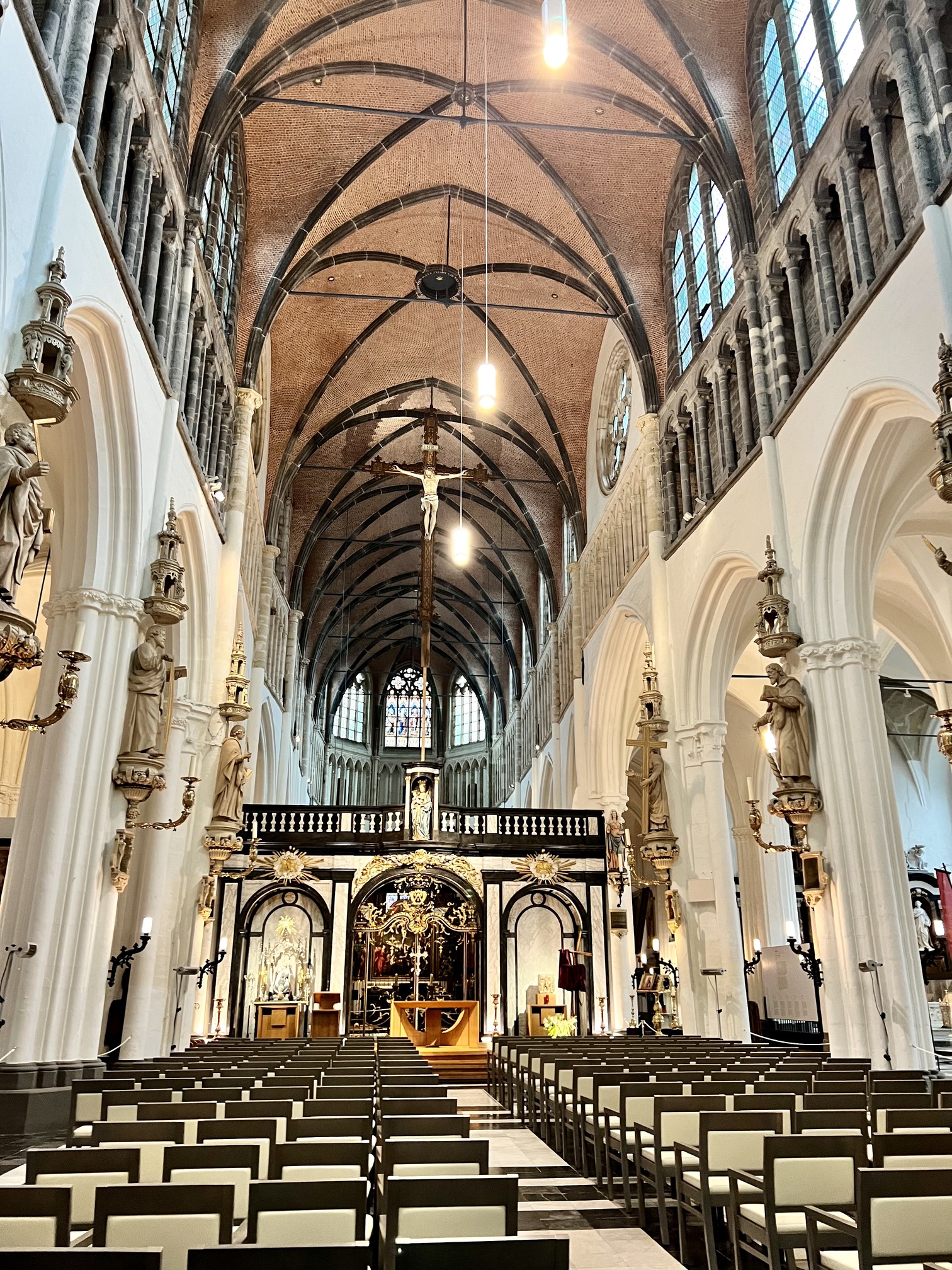
Church of Our Lady
Home to Michelangelo’s world-famous marble sculpture, Madonna and Child. This 115-meter-tall church houses impressive crypts and tombs dating from the 13th-16th centuries. Its main towers are part of the iconic skyline of Bruges. The church is free to visit, but the museum section, which contains Michelangelo’s Madonna, requires a ticket.
Saint John's Hospital
The Old Hospital of St. John dates to the 12th century. It is one of the oldest hospitals in Europe that has since been converted into a museum about medical history, instruments, and artifacts. Inside, you can visit the medieval wards, the church, the chapel, and the pharmacy of the former hospital.
Groeninge Museum
A museum containing incredible paintings by world-renowned Flemish artists such as ‘Madonna with Canon Joris Van der Paele’ by Jan van Eyck and the ‘Moreel Triptych’ by Hans Memling. Inside the gallery are Flemish painters from over six centuries: primitivism, neo-classicism, expressionism, and also 20th-century modern art.
Windmills
A little bit beyond the city center are 4 windmills that will make you wonder if you were in the Netherlands. Originally, there were 23, but only 4 remain: Sint-Janshuismolen (the oldest windmill), Bonne Chiere, De Nieuwe Papegaai, and Koeleweimill. Locals like to deem this area the ‘Windmill Walk’. The windmills are located relatively close together, and some allow you to visit inside.
St. Salvador's Cathedral
Bruges’s oldest and main church. Admire the impressive neo-Gothic architecture, Flemish artwork, and the stained glass. Around the back is a nice little garden and the famous lovers’ bridge.
Frietmuseum
Learn about the history of Belgian frites as the museum explores the production and cultural significance of the Belgian dish. The museum is located in the historic “Saaihalle,” one of the oldest buildings in Bruges, dating from the 14th century. The building itself adds to the charm and experience of visiting the museum. At the end of the museum, you can taste authentic Belgian fries.
Explore the enchanting streets, historic landmarks, and culinary delights of Bruges with this comprehensive travel guide to Bruges. Whether you're captivated by its fairytale charm, eager to sample its famous Belgian chocolate, or simply yearning to wander its cobblestone streets, Bruges offers an unforgettable experience for every traveler. Plan your perfect trip and uncover the magic of this medieval masterpiece with the help of this travel guide to Bruges.
Travel Tip
Embrace the unpredictable weather by packing an umbrella and checking the forecast ahead of time, especially during rainy seasons.
My Playlist for Bruges, Belgium
"In Dulci Jubilo" by Michael Praetorius
"Susato Suite" by Tylman Susato
"Mille Regretz" by Josquin des Prez
"Villancico 'Yo me soy la morenica'" by Juan del Encina
"Basse danse 'La Magdalena'" by Pierre Attaingnant
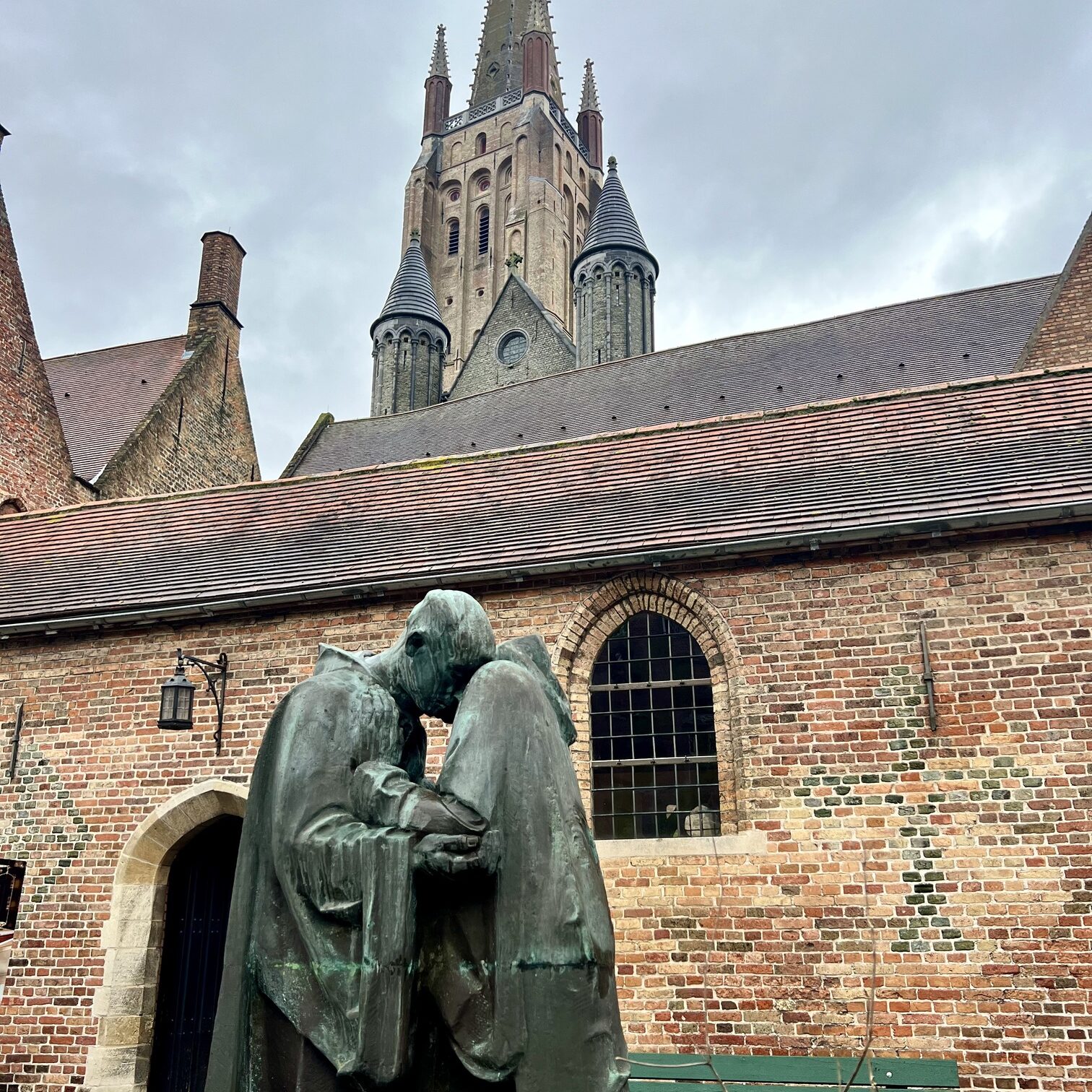
Recommended Reads
Explore Yosemite National Park: A Nature Lover’s Paradise
Key Highlights Next, let’s dive into what makes Yosemite National Park an unmatched treasure of the United…
Local Favorites: What Food to Eat in California
Key Highlights Introduction California, also called the golden state, is a great place for people who love…
Discover the 20 Best Places to Visit in California Now
Key Highlights Introduction California is a place that has something for everyone. You can find natural beauty…



